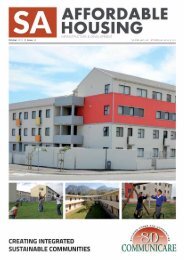InfrAstructure & Development - Trademax Publications
InfrAstructure & Development - Trademax Publications
InfrAstructure & Development - Trademax Publications
Create successful ePaper yourself
Turn your PDF publications into a flip-book with our unique Google optimized e-Paper software.
Infrastructure development<br />
PPC CEO calls for<br />
infrastructure CODESA<br />
Ketso Gordhan, CEO of the leading supplier of cement in southern Africa, PPC Ltd.,<br />
has called for the creation of an infrastructure negotiation body similar to that of<br />
the Convention for a Democratic South Africa (CODESA) as a critical step to kickstart<br />
implementation of much needed infrastructure development in South Africa.<br />
“It is clear that infrastructure bottlenecks by both the<br />
public and private sectors need to be addressed, not<br />
through agreeing to generic accords but rather through<br />
implementable plans with clear roles, responsibilities and<br />
deadlines. The methodology is simple. Before 1994<br />
people wanted a democratic South Africa. The National<br />
Party and the ANC both raised issues that were preventing<br />
them from moving forward in this regard. So, they put<br />
together a working group on each of those issues and<br />
came back with solutions. All the things that we see today<br />
were compromises that emerged from discussions and<br />
negotiations,” said Gordhan.<br />
Speaking at an International Project Finance Association<br />
(IPFA) event in Sandton, Mr Gordhan was adamant that<br />
negotiations between the national government and the<br />
private sector would substantially increase the number of<br />
infrastructure developments completed.<br />
“Moves like this are where we can make the most<br />
significant impact on our global competitiveness as a<br />
country. We continue to score poorly in the World<br />
Economic Forum’s Global Competitive Index and we have<br />
to come to terms with the fact that we cannot boost the<br />
competitiveness of our economy, boost sustainable<br />
infrastructure growth and boost job creation by doing<br />
more than agreeing to the ideals of a plan,” he said.<br />
By getting the national government and private sector<br />
together in one room, Gordhan said that many problems<br />
currently facing the industry would be solved. One of the<br />
biggest issues government has is that they believed they<br />
overpaid on previous public–private partnerships (PPP).<br />
“Let’s use the prison example. Government had a<br />
description of the sort of prison it wanted to have; if you<br />
had a look at the description it looked like a 5-star hotel.<br />
Instead of the private sector coming back and saying that<br />
it is not very functional, now we have something that is<br />
way too expensive. It costs us around R75,000 a year for<br />
one prisoner per year; a pensioner gets R1,200 a month.<br />
If you weigh up those two things; here is a guy who has<br />
done something wrong so we lock him up.<br />
Ketso Gordhan, CEO of PPC Ltd.<br />
The reality is it is costing us that much money each year, it<br />
just doesn’t sound right,” he said.<br />
Regarding previous sectors in the PPP arena, Gordhan<br />
believes there are three reasons why success has been<br />
experienced in the last 15 years. Firstly, it was due to a<br />
strong political will to get the job done.<br />
“If there is a strong political will to get something done,<br />
the chances of success are much higher. We saw that with<br />
the Gautrain project; it was because the MEC, Premier and<br />
the national government really wanted the project to get<br />
done,” he explained.<br />
Secondly, the existence of strong officials on projects was<br />
crucial. “They knew how to get the decisions through the<br />
various mechanisms in government, how to interact with<br />
the private sector, and how to get the best advice to make<br />
things to happen. A strong official makes a huge<br />
difference.”<br />
Gordhan believes that the third reason was the<br />
combination of all of these and the existence of a very<br />
simple transparent process with a clear allocation of risk.<br />
“If all these things are present there will be no debates<br />
about who should be doing what. Once you have a clearcut<br />
mechanism for dealing with the project, the chances of<br />
success improve immensely.”<br />
28<br />
august 2013















